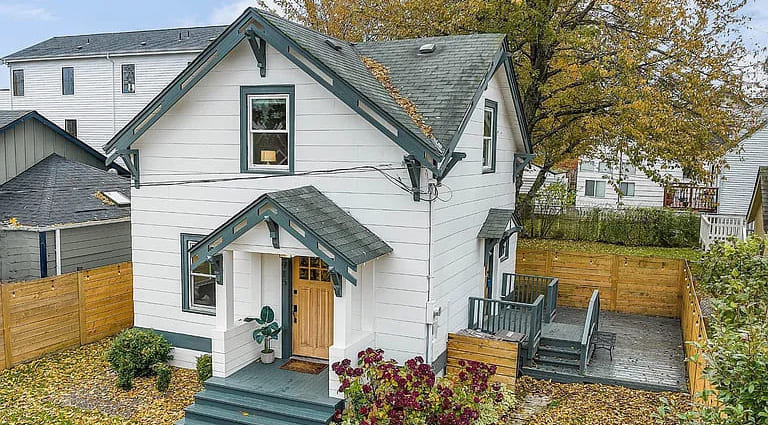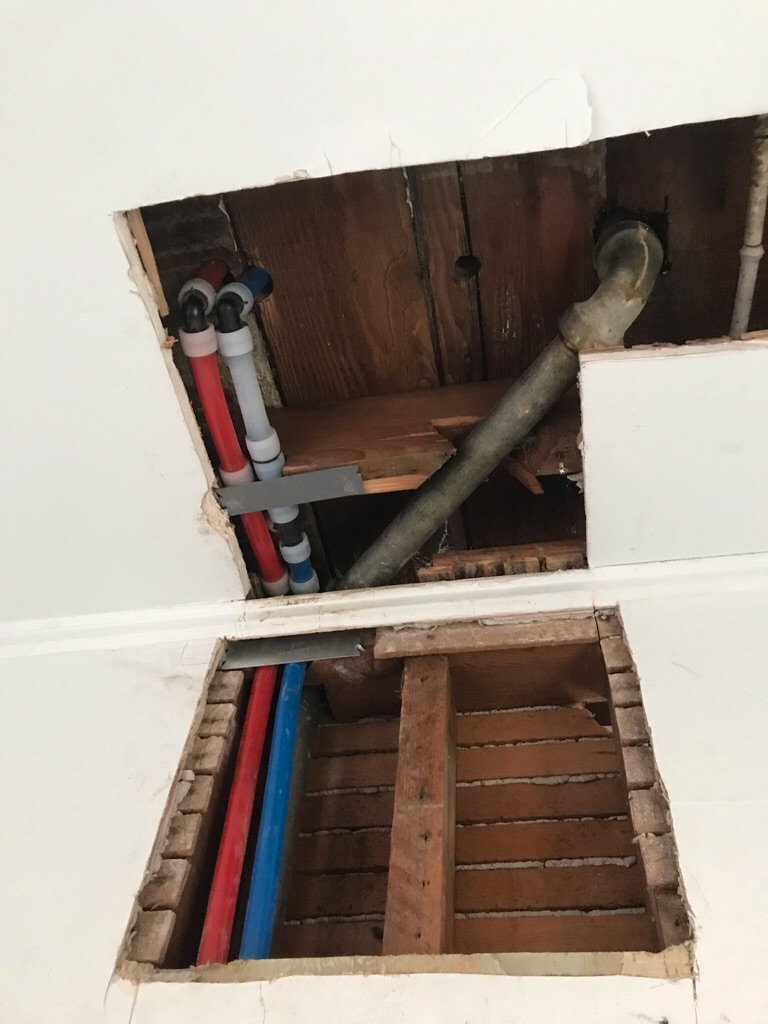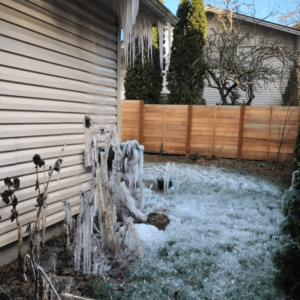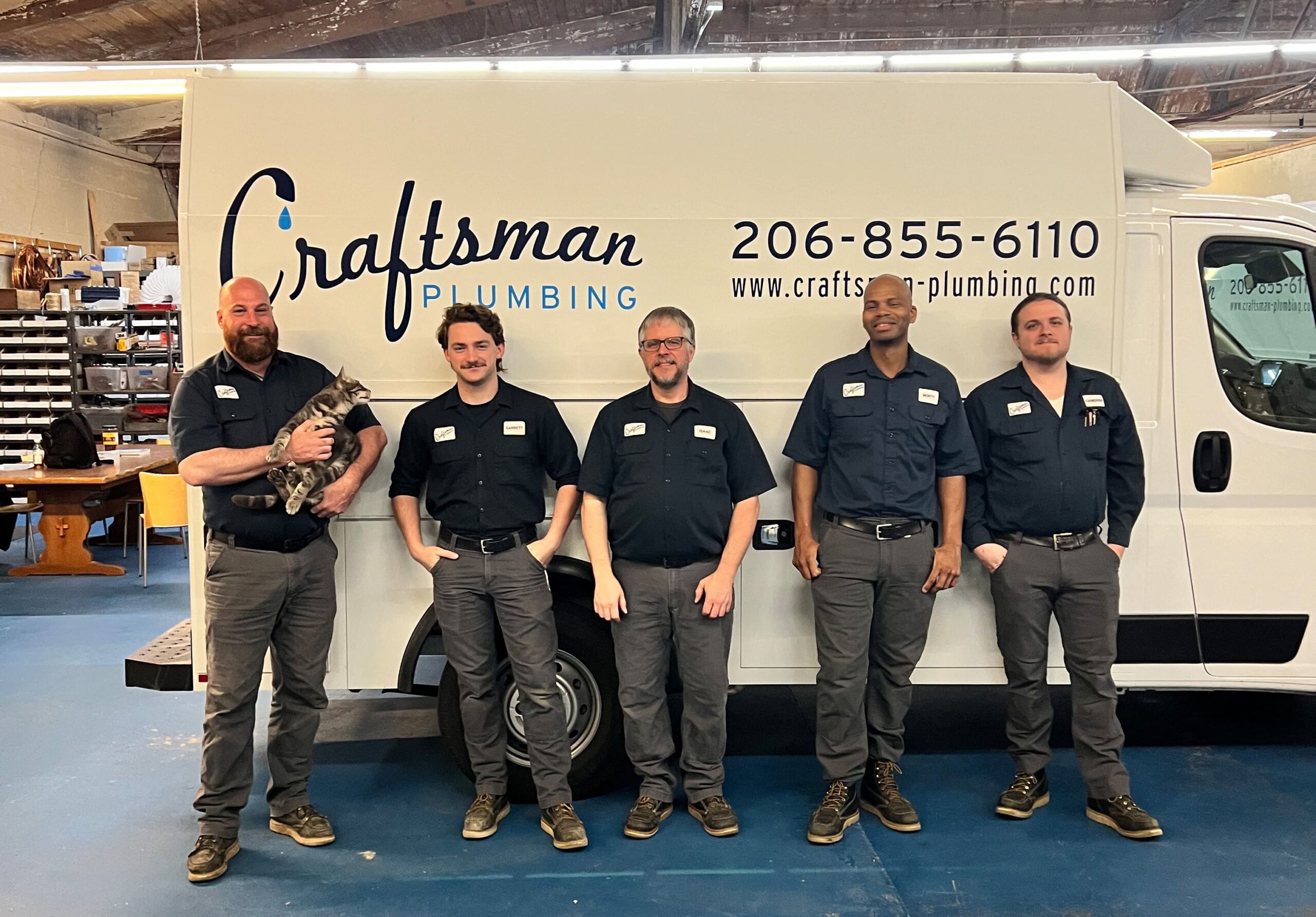Seattle homeowners face a crucial choice when their plumbing systems need repiping. Many local homes now deal with aging pipes that require replacement. Most are told differently whether to choose PEX repiping or cooper repiping.
The choice between traditional copper and modern PEX repiping can substantially affect your property’s future value and performance. Traditional copper pipes have protected Seattle homes through decades of use. PEX repiping is a chance to explore newer benefits that could match your home’s requirements better.
Your decision-making process should consider how these materials perform in Seattle’s wet climate and their lasting value. This knowledge will help you choose the best option for your home’s plumbing future.
Understanding Seattle’s Unique Plumbing Challenges

1915 Seattle Home that needed whole home repipe
Seattle’s unique weather patterns can really affect your home’s plumbing system. The city’s climate creates specific challenges that will shape your decision between copper and PEX piping materials.
How Seattle’s Climate Affects Your Piping
Temperature changes in Seattle put a lot of stress on plumbing systems. The city has gotten 1.3°F warmer since 1895 and experts predict it will be 5.5°F warmer by 2050.
Your pipes might freeze when winter temperatures drop below 32°F, especially if they’re in exposed or unheated areas. Here are the key weather factors you should know about:
- Winters are getting wetter with more storms
- Summers are becoming hotter and drier, which changes water pressure
- Sea levels have risen nine inches since 1900, and this affects properties near the coast
- Regular temperature swings make pipes expand and contract
What You Should Know About Local Water Quality
Your water comes straight from protected watersheds in the Cascade Mountains. Seattle treats its water with pipe longevity in mind.
Recent tests show trihalomethane levels between 18 and 53 parts per billion in treated water. These levels can affect how different pipes hold up over time.
Plumbing Problems Seattle Homeowners Face
The city’s aging infrastructure creates some tough challenges for homeowners. Tree roots often cause problems, especially in older neighborhoods. Old infrastructure combined with our climate leads to several issues homeowners face regularly.
Homes built before 1986 face higher risks because they likely have older plumbing systems. Seattle’s heavy rainfall also creates problems for home foundations and basements that can harm your plumbing system.
Important Note: You need to pay extra attention if your home has galvanized pipes. Seattle has about 9,000 known galvanized service lines throughout the city.
If you keep running into plumbing problems, Craftsman Plumbing’s experts can assess your home’s needs and suggest the best piping solution for Seattle’s conditions.
Copper Piping: A Time-Tested Solution
Copper piping remains a proven solution that has delivered reliable performance for decades in Seattle homes. This traditional choice brings several advantages that deserve a closer look.
Durability in Pacific Northwest Conditions

Looking at the seattle skyline with a mix of seasonal color
Copper piping shows remarkable durability and lasts 50-70 years on average. Manufacturers back new installations with 50-year warranties to protect your investment. Seattle’s seismic zones make copper’s natural flexibility a valuable asset because it resists snapping during earthquakes.
The material’s strengths include:
- Knowing how to handle pressure up to 1,000 PSI
- Exceptional corrosion resistance
- Superior heat tolerance
- Natural resistance to bacterial growth
Installation Requirements and Building Codes
Seattle’s specific building codes govern copper pipe installations. The 2018 Washington State Plumbing Code with Seattle amendments sets the standards. Professional installations need protective measures. These include sheathing for pipes that pass through concrete or cinder walls and proper insulation where freezing might occur.
Long-term Cost Analysis for Seattle Homes
Copper demands a higher original investment of $18.00 to $24.00 per linear foot, but its longevity makes this cost worthwhile. Labor costs make up about 70% of the total repiping project. Most repiping projects range from $2,167 to $24,132, with average costs depending on home layout, fixture location and features like if there is a crawlspace or an unfinished basement.
PEX Piping: The Modern Alternative
PEX (cross-linked polyethylene) has become a top choice for Seattle homeowners who need reliable repiping solutions. Modern plumbing has changed by a lot, and this innovative material solves many common plumbing problems.
Flexibility and Freeze Resistance Benefits
PEX’s unique properties make your home’s plumbing system more durable. The material stays flexible even at -40°C, which helps during Seattle’s winter months.
PEX pipes can expand and contract without damage when water freezes. This feature protects your plumbing system during unexpected cold snaps.
These pipes can:
- Resist scale and chlorine damage
- Avoid corrosion issues common in traditional materials
- Handle freeze-thaw cycles effectively
- Expand up to three times its diameter without breaking
Installation Advantages in Seattle Homes
PEX’s remarkable adaptability makes it perfect for Seattle homes. The system needs 20-80% fewer fittings than traditional options, which reduces potential leak points. PEX bends around obstacles and fits through tight spaces without extra connections, making installation quick and simple.
Cost-Effectiveness in Current Market
PEX repiping saves you money in several ways. The material costs just one-third of traditional copper piping and lasts 40-50 years. You’ll spend less on installation because it takes less time to set up. Your home’s water pressure improves thanks to PEX’s smooth interior walls and fewer joints.
Making the Right Choice for Your Seattle Home
The right piping material choice for your Seattle home goes beyond just material costs. Here’s how you can make this significant decision for your property.
Evaluating Your Home’s Specific Needs
Your property’s unique characteristics will determine the best choice between PEX and copper. These factors matter most:
- Age and current plumbing configuration
- Property type and layout complexity
- Water pressure requirements
- Local building code compliance
- Budget constraints and financing options
PEX provides substantial advantages that most homeowners appreciate, especially when you have installation costs in mind. The material’s flexibility enables installation with fewer joints and delivers better water pressure performance than traditional copper systems.

PEX Repiping old house in Seattle WA
ROI Comparison for Different Property Types
Property size and chosen material substantially impact your repiping investment. PEX installation typically costs about half as much as copper. Here’s the cost breakdown for different property sizes:
| Property Size | Average Cost Range |
| Small Home | $9,000 – $18,000 |
| Medium Home | $17,000 – $28,000 |
| Large Home | $26,000 – $40,000+ |
PEX shows better long-term returns on investment, with studies that indicate a potential lifespan of up to 100 years. Seattle homeowners increasingly prefer PEX because of its extended durability and lower upfront costs.
Future-Proofing Your Plumbing Investment
Material selection and proper maintenance determine your plumbing system’s longevity. PEX demonstrates superior freeze resistance, which becomes vital in Seattle’s climate. Both materials deliver potable water effectively, but PEX’s predicted lifespan surpasses copper by decades.
These factors help future-proof your investment:
- Installation flexibility for future modifications
- Resistance to environmental factors
- Adaptability to changing water quality standards
- Long-term maintenance requirements
Clothing Thoughts On PEX Repiping
Your Seattle home’s future depends on the choice between copper and PEX repiping. Copper pipes are a time-tested option that last 50-70 years. PEX stands out as a budget-friendly alternative that works great with Seattle’s unique climate challenges. The best choice for you depends on your home’s age, layout, and budget.
PEX works really well in Seattle’s weather because it resists freezing and bends easily. Copper remains a solid pick for many homeowners due to its proven track record.
Each material brings unique benefits that could work for your property based on your needs and future plans. This decision will affect your home for decades to come. A qualified Seattle plumber can help you make the right choice.
Call 206-855-6110 today to get a home repipe estimate. Craftsman Plumbing’s experienced team will assess your options and recommend the best repiping solution that fits your home’s needs.
Frequently Asked PEX Repiping Questions
- Do plumbing professionals have a preference between PEX and copper piping?
While copper has traditionally been the preferred choice, PEX (cross-linked polyethylene) is increasingly popular due to its adaptability to various climates, soil conditions, and water chemistries. The best choice can vary depending on these factors. - Is it advisable to switch from copper to PEX piping?
Yes, switching to PEX can be beneficial as it offers greater efficiency. PEX pipes have lower thermal conductivity compared to copper, which minimizes heat loss as water travels through them, thereby conserving energy. - What is the durability comparison between PEX and copper piping?
Copper pipes generally last between 50 to 70 years, outlasting PEX pipes, which have a lifespan of about 30 to 50 years. - Why is copper less commonly used by plumbers nowadays?
Copper has become less favored because it is expensive, susceptible to corrosion depending on the pH levels of the water, and vulnerable to bursting in cold climates when water freezes. - Is opting for copper repiping a better choice than PEX?
Choosing between copper and PEX repiping depends on specific needs such as budget, local environmental conditions, and the long-term durability required. Copper is often valued for its longevity and reliability under various conditions.



